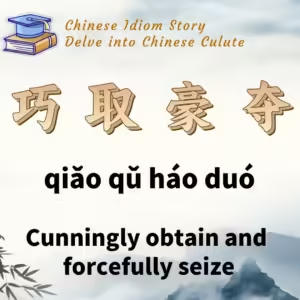
Chinese Idiom: 不入虎穴,焉得虎子 (Bu Ru Hu Xue, Yan De Hu Zi)
English Translation: If you do not enter the tiger’s den, how can you get the tiger’s cub?
pīn yīn: bù rù hǔ xué, yān dé hǔ zǐ
Idiom Meaning: This idiom emphasizes that without taking risks, one cannot achieve success. It is often used to illustrate the idea that one must go through difficult or dangerous experiences to obtain valuable results or true knowledge.
Historical Source: Book of the Later Han (《后汉书 ·班超传》)
Idiom Story:
In the year 73 AD, during the Eastern Han Dynasty, the famous general Ban Chao was appointed by Dou Gu, a senior official, to lead a small military expedition against the Xiongnu, a nomadic tribe that often threatened China’s borders. Ban Chao successfully defeated the Xiongnu and returned victorious. Recognizing his talent, Dou Gu assigned Ban Chao and another official, Guo Xun, along with 36 others, to travel to the Western Regions (a vast area west of present-day Dunhuang, Gansu Province) to establish alliances.
Ban Chao and his group first arrived in the Kingdom of Shanshan (located in present-day Shanshan County, Xinjiang). The King of Shanshan initially treated them with great respect and hospitality. However, Ban Chao noticed that the king’s attitude suddenly became cold and indifferent. Sensing something was wrong, Ban Chao told his men, “Have you noticed the king’s change in attitude? This must mean that the Xiongnu have also sent envoys here. The King of Shanshan has always been indecisive, and now he is unsure whom to align with.”
To confirm his suspicions, Ban Chao summoned a local servant and tricked him into revealing the truth, asking, “How many days have the Xiongnu envoys been here? Where are they staying?” The servant, frightened, confessed the situation. To prevent the news from leaking, Ban Chao detained the servant. He then gathered his 35 soldiers and explained the situation, saying, “Now that the Xiongnu envoys have arrived, the king has become cold toward us. If the king decides to hand us over to the Xiongnu, we will certainly be killed. Do you want to die here, or do you want to accomplish something great for our country?”
The soldiers, realizing the danger, pledged to follow Ban Chao’s command. Ban Chao then famously said, “不入虎穴,不得虎子” (If you do not enter the tiger’s den, you cannot get the tiger’s cub). He continued, “The only plan now is to launch a surprise attack at night, using fire to attack the Xiongnu envoys. They do not know how many of us there are, so they will be greatly frightened, and we can wipe them out. If we eliminate them, the King of Shanshan will be terrified, and our mission will be successful.”
That night, Ban Chao led his soldiers in a surprise attack on the Xiongnu envoy’s camp. They surrounded the camp, set it on fire, and killed the Xiongnu envoys and over 30 of their attendants. More than a hundred Xiongnu were burned alive. The next day, Ban Chao visited the King of Shanshan and presented the heads of the Xiongnu envoys. The king was greatly shocked. Ban Chao then explained the situation and reassured the king, who finally agreed to send his son to the Han Dynasty as a hostage, signifying his willingness to maintain a long-lasting peace with the Han Empire.
This story became the origin of the idiom “不入虎穴,焉得虎子” (If you do not enter the tiger’s den, how can you get the tiger’s cub?), which highlights the importance of taking risks to achieve significant success.






